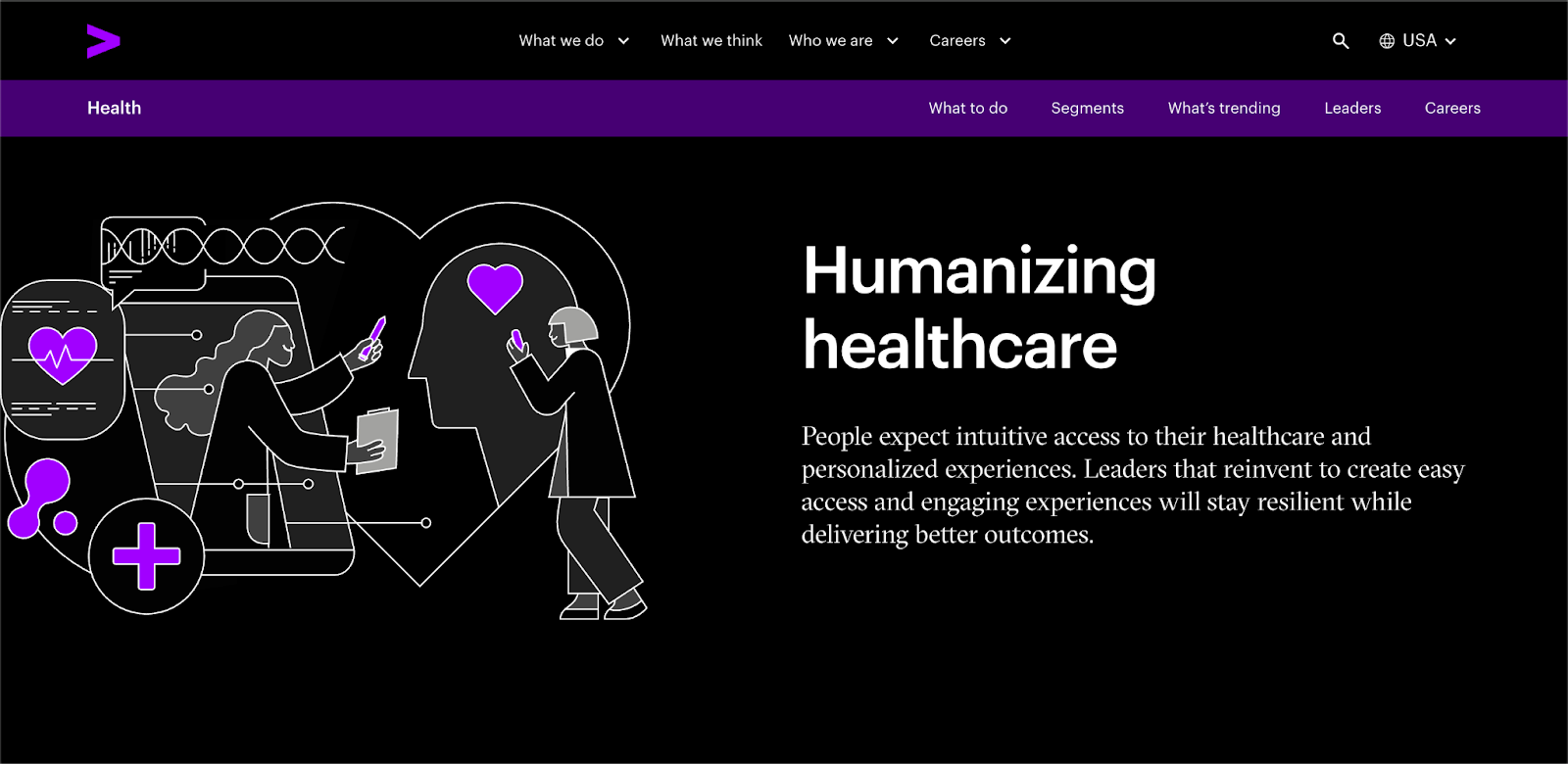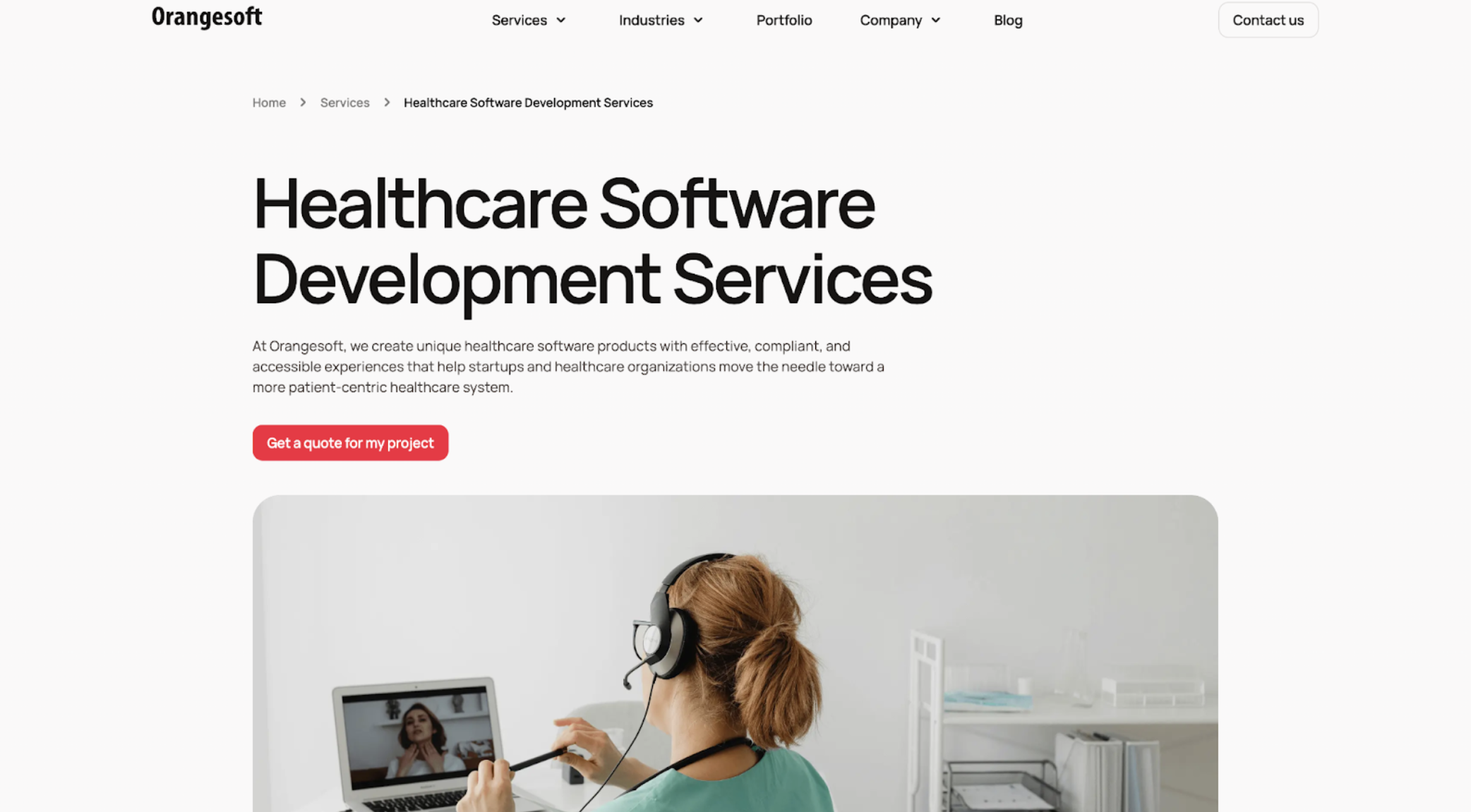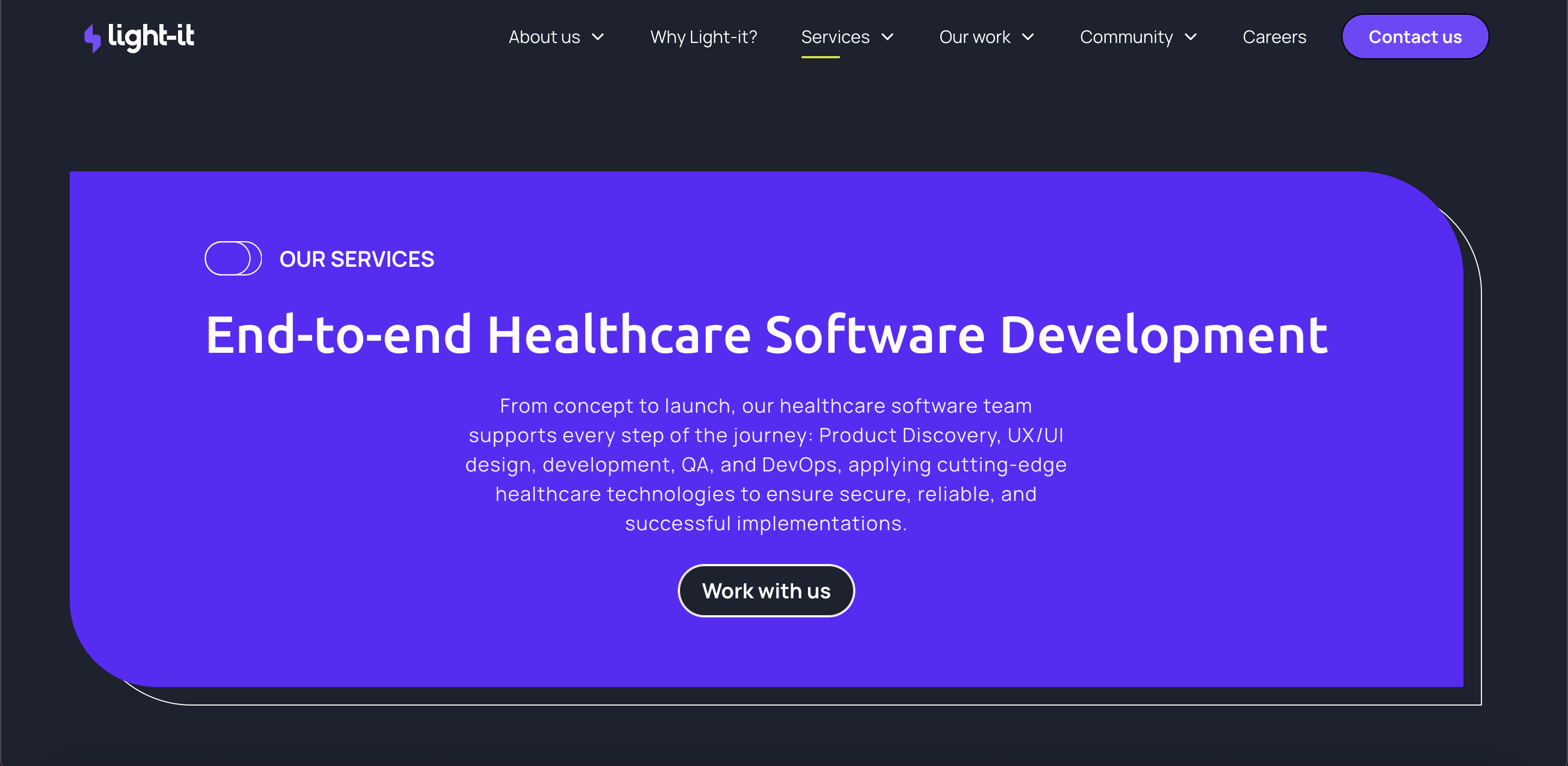Key Takeaways
- The healthcare software market is saturated with companies making similar claims about compliance and patient focus.
- Most rankings lack substance and context, serving search engines rather than decision-makers.
- This list offers authentic insights from industry insiders who work directly with healthtech startups.
- The right development partner depends on your specific needs: scale, specialization, budget, and project complexity.
- Startups need partners who understand both healthcare regulations and the need for speed in validation and development.
- Enterprise-grade healthcare solutions require different capabilities than nimble startup MVPs.
- The best healthcare software partners bring value beyond coding, offering strategic guidance, compliance knowledge, and industry context.
Is Your HealthTech Product Built for Success in Digital Health?
.avif)
The healthcare software scene is crowded. Everyone claims HIPAA compliance. Everyone says they're “patient-centric.” But when you're building something real, something that lives in the complex space between care, regulation, and tech, you need more than buzzwords. You need clarity. And you need a partner who knows what they're doing.
Most rankings out there? They're copy-paste jobs. Lists without context. Pages written to impress search engines, not help decision-makers.
This one's different.
We live and breathe digital health. We work with startups and scaleups building the future of care. And we're not here to be objective, we're here to be helpful. That means sharing our honest view of who's worth your attention in 2026, including Momentum, where we've helped startups launch health products with real traction, not just working code.
Here's who we'd actually consider working with in 2026, and why. The big names, the specialists, the promising challengers, and yes, us too.
Introduction to Healthcare Software Development
Healthcare software development sits at the heart of today’s healthcare industry, powering everything from patient care to back-office operations. As healthcare providers face rising expectations for digital health, the demand for innovative healthcare software solutions has never been higher. The right software can mean the difference between clunky workflows and seamless patient experiences, between data silos and actionable insights.
Healthcare software development companies are the driving force behind this transformation. They design and build custom healthcare software solutions tailored to the unique needs of healthcare organizations, whether that’s a hospital looking to streamline patient data management, a clinic aiming to boost patient engagement, or a startup launching a new telemedicine platform. These companies don’t just write code; they navigate the complex world of regulatory compliance, data security, and interoperability, ensuring every solution meets the highest standards for quality and safety.
From custom healthcare software development to robust telemedicine software and electronic health record (EHR) systems, these partners help healthcare organizations improve patient outcomes, enhance operational efficiency, and stay ahead in a rapidly evolving digital health landscape. In short: great healthcare software isn’t just about technology, it’s about enabling better care, smarter decisions, and a healthier future.
Types of Healthcare Software
The healthcare industry relies on a diverse ecosystem of software solutions, each designed to tackle specific challenges and improve patient care. At the core are electronic health records (EHRs), which digitize patient medical histories and make vital information accessible to healthcare professionals when and where they need it. Telemedicine software has become essential, enabling remote consultations, virtual care, and real-time patient monitoring, breaking down barriers to access and convenience.
Practice management software streamlines the administrative side of healthcare, handling everything from appointment scheduling to billing, while medical billing software automates complex reimbursement processes and reduces errors. But the real power comes from custom healthcare software solutions that integrate these tools into a single, comprehensive healthcare software solution tailored to the workflows and goals of each healthcare organization.
Modern healthcare software development companies leverage advanced technologies like cloud computing, artificial intelligence, and machine learning to create solutions that not only enhance patient care but also drive operational efficiency. These innovations help healthcare providers reduce operational costs, improve patient outcomes, and deliver a higher standard of care. Whether it’s automating administrative tasks, supporting clinical decision-making, or enabling seamless data sharing, today’s healthcare software is all about making healthcare smarter, faster, and more connected.
Accenture
See example: Well: Transforming Swiss Healthcare | Accenture
Let’s begin where most lists do: with scale. Accenture is one of the biggest consultancies on the planet, and they’ve got a deep healthcare and life sciences division, with technology expertise in building and maintaining complex healthcare systems. Think: global payers, sprawling provider networks, and complex infrastructure projects.
For these organizations, Accenture delivers. They can handle digital transformation on a massive scale. Their solutions also support care coordination across large provider networks, streamlining information flow and improving patient outcomes. But for early-stage companies looking to move fast and validate new ideas? Their size becomes a hurdle.
Still, they earn their place here. Just not for everyone.

Netguru
See example: Scalability with Webflow: Designing and Developing Polpharma API Website
Netguru is known for its sleek UX, strong design sensibility, and a sharp team that’s expanded into healthtech with confidence. Their work spans patient apps, wellness platforms, and even some fintech-health hybrids. They have expertise in delivering custom software and custom healthcare solutions that are tailored to meet regulatory standards, integrate with existing systems, and match specific organizational workflows.
If you care about experience, usability, and visual polish, they’re worth talking to. Their design-led approach also plays a key role in enhancing patient care by improving usability and supporting better healthcare outcomes. Just make sure they’re ready to go as deep as your project demands, especially if you’re building something clinically complex or compliance-heavy.

Momentum
See example: How InnGen Brought Medical Testing into the Digital Age | Case Study
We’re not neutral. We believe in what we do. And if you’re a healthtech founder trying to bring something new into the world, we think you’ll understand why we’re on this list.
At Momentum, we help startups validate, design, and launch healthcare products fast. We have extensive experience in medical software development, enabling us to create innovative and secure healthcare applications. We understand the trade-offs, the regulations, and the reality of trying to move quickly without breaking what matters.
We challenge when it helps. We adapt when it counts. As a healthcare software developer, we deliver custom healthcare solutions that enhance patient engagement and support your business goals. We build with the business in mind, not just the backlog.
If you need a partner who can do more than code, one who gets the big picture and still delivers the small details, we’d love to talk.

Orangesoft
See example: Orangesoft: FDA-compliant software for stroke patients, developed for a US hospital network.
Orangesoft has specialized in healthcare software development since 2011, with one constant: compliance comes first. Their team of 100+ tech experts helps healthcare organizations of all sizes balance innovation with the demands of regulatory frameworks such as HIPAA, GDPR, FDA, and MDR. The software they deliver, whether it’s a telemedicine app, software as a medical device, or any other healthtech solution, is engineered to meet the highest industry standards.
Orangesoft’s technical expertise covers all aspects of healthcare innovation: custom healthcare software development, accessible UX/UI design, AI-driven applications, and IoMT integration. Each solution is rooted in ISO/IEC standards, with comprehensive documentation to support clients through regulatory submissions.

Light-it
See example: Weight loss powered by GLP-1: clinically backed and personally guided
Light-it is a 160-member product and engineering product agency dedicated to healthcare. They operate like a boutique partner: hands-on, selective, and deeply involved in each product they help build.Their team blends strategy, design, engineering, and regulatory know-how to create tools that clinicians and patients can rely on. Every engagement is set up as a partnership, with shared goals and a shared roadmap.
Their team has supported companies like Mavida Health, Oxford Mindfulness Foundations, ABinBev Foundation, Fridays, and others across mental health, sleep health, wellness, primary care, and clinical operations. With a focus on clarity, collaboration, and excellent execution, Light-it brings both product thinking and engineering depth to each engagement.

ScienceSoft
See example: Development of a Physiotherapy Platform for AKLOS Health - Case Study
Some companies specialize in speed. ScienceSoft specializes in structure.
They’ve been around for decades and bring experience in building the systems that keep healthcare running behind the scenes: clinical decision tools, lab systems, claims workflows. They have deep expertise in optimizing clinical processes and leveraging healthcare data analytics to improve efficiency and outcomes. Not the kind of work that ends up in glossy pitch decks, but absolutely vital.
They’re not built for lean MVPs. But for enterprise-grade systems with real complexity, including managing and securing medical data for enterprise clients? They’re a dependable choice.

Avenga
See example: Automation of internal budget processes for a leading Biopharma enterprise
Avenga operates at the intersection of healthcare and life sciences, particularly on the pharmaceutical and research side. They understand the nuance of clinical trials, regulated CRM, and medtech workflows. Avenga also has experience working with medical device manufacturers, delivering custom medical software tailored to their specific operational and technical needs.
They bring process maturity, global reach, and deep compliance knowledge. If your product serves pharma or large-scale healthcare orgs, they bring serious value, including the development of advanced healthcare software solutions for complex organizations.
For smaller teams, their size may feel like overkill. But for those who need scale and structure, they fit the bill.

HTD Health
See example: Case Study of Persana’s Physician-Patient Matching Platform
HTD is one of the few on this list that works exclusively in healthcare. That focus shows in their client list, their process, and their ability to understand both technology and care delivery. Their healthcare software development solutions are tailored to improve patient care, streamline operations, and drive innovation, including experience with remote patient monitoring software that meets industry standards.
They’ve partnered with startups across mental health, maternal care, chronic conditions, and more. If you’re early-stage and need a team that “gets” the realities of health, HTD is a good match, with a strong commitment to patient data protection and regulatory compliance.
We see them often. We respect their work.

Health Samurai
See example: Aidbox FHIR Platform for the development of Immunix for precision medicine
Some products live and breathe interoperability. Health Samurai was built for those products.
They created Aidbox, one of the most flexible FHIR backends available. If your team is wrestling with health data standards, APIs, or complex data orchestration, this is their home turf. Health Samurai is also committed to protecting sensitive medical data by implementing strong data encryption, user authentication, and compliance measures to prevent data breaches and ensure regulatory compliance.
They’re specialists, not generalists. But in that niche? They’re among the best, with robust security protocols in place to protect sensitive medical data in interoperable systems.

Significo
See example: Significo: A Smart Health And Wellness Coach For A Large Insurance Company
Significo leans into design, but with heart. They care deeply about behavior, empathy, and experience in health. If your product relies on patient engagement or behavior change, they bring valuable perspective. Significo has expertise in developing patient portals that enhance access to health records, streamline communication, and support medical staff in delivering better care.
They’re especially strong on front-end product experience and research-backed design. For startups building tools that people actually want to use? That matters, and their solutions are built with a commitment to safeguarding sensitive patient data.
They’re not the biggest team. But what they do, they do well.

Which Healthcare Software Development Company Is Right for You, Then?
That depends on what you’re building and what kind of partner you need.
Need scale and enterprise structure? Accenture or Avenga might make sense. Looking for a specialist in data, infrastructure, or UX? Consider Health Samurai, ScienceSoft, or Significo.
But if you’re a startup founder navigating uncertainty, trying to validate fast, and build something real in healthcare? Then you need a partner who brings speed, clarity, and a deep understanding of the space.
That’s what we built Momentum for.
Let’s build something that works together. Reach out here!
Frequently Asked Questions
Look for companies with experience in regulated environments, a track record in HealthTech, and a cross-functional approach that includes product, engineering, and compliance. Certifications like ISO 13485 and HIPAA knowledge are non-negotiable.
Healthcare has unique challenges—like EHR integration, patient privacy laws, and clinical workflows. Generalist agencies often miss critical details. A specialized partner understands compliance, user needs, and the pace of innovation in HealthTech.
Yes. ISO 13485 certification shows a company has formalized quality management processes for medical-grade software. It’s a strong signal that your partner can support CE-marked or FDA-ready digital health products.
The best companies embed compliance into the development process—covering data architecture, consent flows, vendor vetting, and documentation. It’s not just a legal check—it shapes the product from day one.
Healthcare products often grow fast—from MVPs to enterprise deals. A good partner should be able to scale infrastructure, code quality, team processes, and security posture without losing speed or focus.
Momentum combines deep HealthTech experience with startup-grade speed and enterprise-grade discipline. We build compliant, scalable software for digital health innovators—backed by ISO 13485 certification and a battle-tested track record across clinical, patient-facing, and analytics platforms.
We’ve helped build AI diagnostics platforms, appointment automation tools, EHR-integrated clinician dashboards, compliant mobile health apps, and HIPAA-secure patient engagement systems—across the U.S., UK, and EU.















.png)

.png)

.png)
